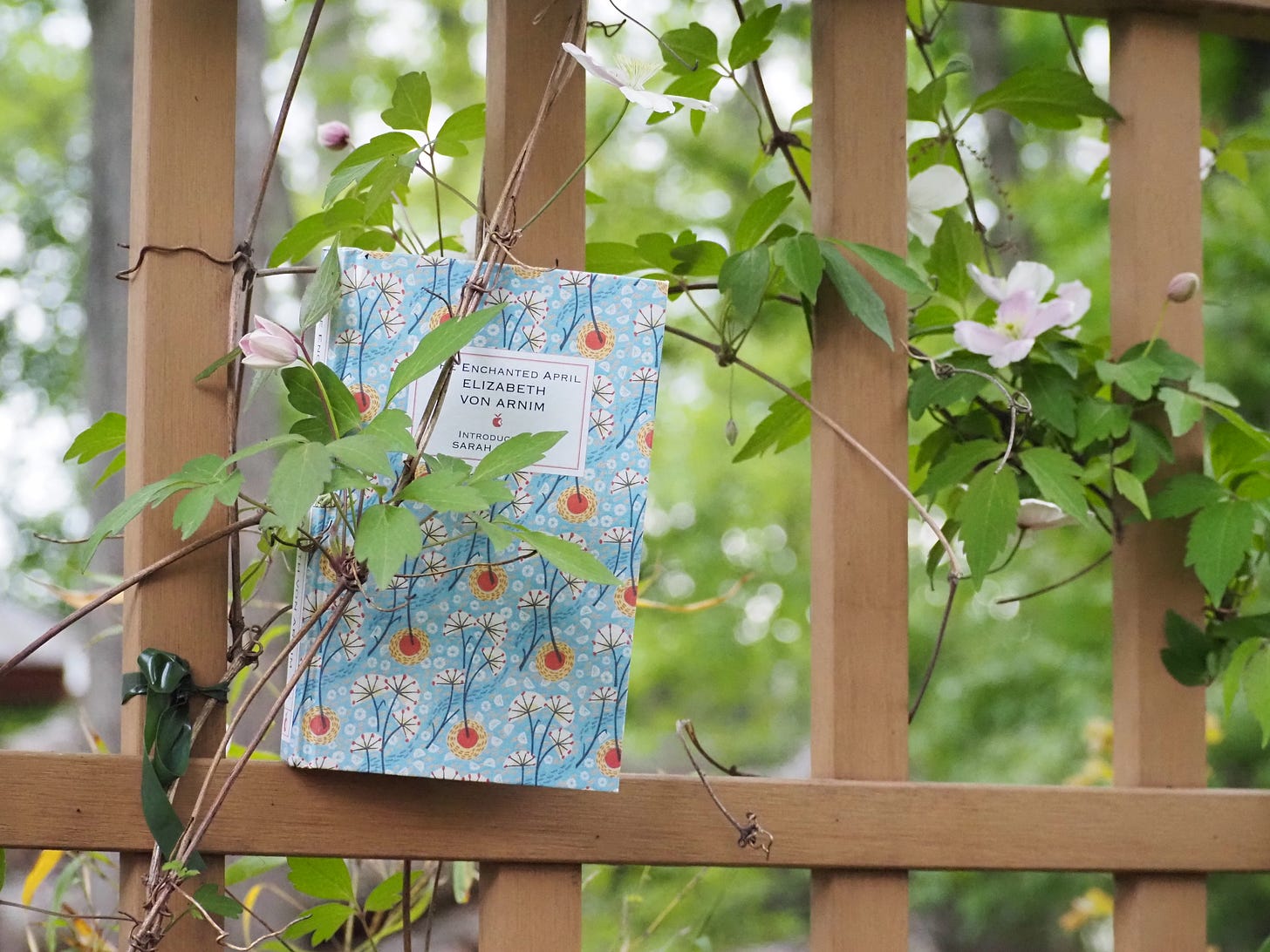As I’ve been putting together this blog and editing my monthly reading wrap-up video, I realized there were some unplanned common themes connecting most of my April book picks: cozy British authors and European travel. But I suppose those two elements could be called a constant theme in my reading at any time of the year, because they’re two of my favorite things!
From Austria to Italy, from Scotland to South America, here’s a look at where this past month’s reads took me…
The Enchanted April by Elizabeth Von Arnim
On the 30th of April, I remembered that I had purchased this book back in the fall, intending to read it in the spring. In fact, it would be a fun book to read in either the spring or summer, because it’s full of flowers and Italian sunshine and does a great job evoking a lazy yet thoughtful vacation-y mood.
The story follows four British women, strangers to each other, who are escaping their humdrum everyday to spend the month of April on holiday in a medieval castle in Italy. The beautiful descriptions of the castle and gardens were some of my favorite parts of the book:
“The delicate and delicious fragrance of the freesias came in through the door and floated round Mrs. Wilkins’s enraptured nostrils. Freesias in London were quite beyond her. Occasionally she went into a shop and asked what they cost, so as just to have an excuse for lifting up a bunch and smelling them, well knowing that it was something awful like a shilling for about three flowers. Here they were everywhere, -bursting out of every corner and carpeting the rose-beds. Imagine it - having freesias to pick in armsful if you wanted to, and with glorious sunshine flooding the room, and in your summer frock, and it’s being only the first of April!”
This book absolutely makes you want to escape to Italy…although in some ways, the characters don’t really escape. Von Arnim did a good job of capturing how travel can make you dreamy and introspective and give you a new perspective on your life back home. We get a chance to see this in all of the characters’ inner monologues.
“Scrap began to cheer up. If nobody at San Salvatore had ever head of her, if for a whole month she could shed herself, get right away from everything connected with herself, be allowed really to forget the clinging and the clogging and all the noise, why, perhaps she might make something of herself after all. She might really think; really clear up her mind; really come to some conclusion.”
I did enjoy this book, and yet it had a subtly cynical overtone that kept me from loving it. I never entirely clicked with the characters, and I didn’t care for some of their storylines, but I would give the book high marks for its ambience, and the writing was very good.
Charlotte Fairlie by D.E. Stevenson
D.E. Stevenson is one of my favorite authors, and it’s so delightful that she wrote so many books, because there are still plenty of her titles that I haven’t read yet. This was my first time reading Charlotte Fairlie, and I really enjoyed the variety of setting. Our heroine Charlotte is the headmistress of a girls’ school in Britain, but we also follow her to a conference in Copenhagen and to a stunning, remote Scottish island. Stevenson’s plots are cheerful and charming but also have some depth to them, and I love how she weaves in interesting observations and conversations that get you thinking:
“Och, I could tell you some stories about the things we did! I have thought sometimes it would be a fine thing to make a poem about it like they did about battles in the old days.”
“Why don’t you?” Charlotte asked.
“It is not in me to make a poem,” replied Euan regretfully. “It seems that we have lost the art. Men are as brave now as they were in the old days but there are no bards to weave songs and poems about their deeds…so people forget.”
“Why are there no bards, I wonder.”
“That is a big question,” said Euan, turning his head and smiling at her. “I have often wondered that. Maybe it is because people can read the newspapers and listen to the radio. Long ago it was the bards who brought the news (made into songs so that it could be remembered more easily); they went from place to place and were welcomed wherever they went.”
Susan Settles Down by Molly Clavering
Molly Clavering was a friend of D.E. Stevenson! I enjoyed Clavering’s book Near Neighbors so much that I was hoping to love Susan Settles Down as well, but it didn’t quite measure up. The writing seemed very uneven; certain scenes dragged, and the extended comedic episodes felt forced and out-of-place. However, there were also some cozy and well-written scenes, and some good book recommendations!
Far from objecting to a solitary luncheon, Susan liked it, for it gave her an excuse for taking a book to table with her, and she loved reading during her meals. Today her rissoles were shared with the Newcomes, and parting reluctantly from these old friends just as the inimitable F. B. called on the Colonel in Mr. Honeyman’s rooms, she betook herself to the spare-bedroom most remote from the front door, determined to write without interruption.”
My mother and I read many of the same books, and it’s always fun to come across her notes, either written in the margins or bookmarked in the kindle version. In this case, she noted that she went on to read The Newcomes by Thackeray with considerable enjoyment. Thackeray also popped up in The Enchanted April, where one of the characters noted “the tonic powers of that astringent pen,” so I think I will have to try him in May!
A Company of Swans by Eva Ibbotson
This novel also had a bookish heroine who expressed some thoughts that I’m sure bookish readers can sympathize with…
“Loneliness had taught Harriet that there was always someone who understood - it was just that so very often they were dead, and in a book.”
“Harriet had always loved words: tasted them on her tongue, thought of them as friends. The word serendipity was one she valued especially, its meaning rooted in the world of fairy tales: “The faculty of making fortunate discoveries by accident.”
Eva Ibbotson’s characters are often well-versed not only in literature but also art, music, and theater; they are also so warm-hearted and enthusiastic and well-drawn. The cast of this ballet company was delightfully quirky. The story begins in Cambridge, takes a detour to a beautiful British estate, then winds up the Amazon, “which is so mighty they call it the Rio Mare…the River Sea,” to reach the magnificent Opera House in the city of Manaus in Brazil. The only caution I would give about Eva Ibbotson’s adult novels is that they are for adults…some of her characters have morality in certain matters which Ibbotson herself, I believe, describes as European. For me, it did detract from what is otherwise a wonderful book.
The Green Empress by Elizabeth Caddell
The cover of my kindle copy of The Green Empress simply featured a view of rolling countryside, so it didn’t give me much clue as to who or what “The Green Empress” would actually be. I would not have expected what we discover within the first few pages: that the Green Empress is an ultra-comfortable European tour bus company for the ultra-wealthy. Our hero, Angus Graham, has just taken a temporary job as a tour guide (excuse me, liaison officer) aboard the Green Empress, and he is looking forward to the trip from London to Lisbon and the beautiful, historic scenery:
“This is the country of Le Cid you’re walking this minute along roads that his horse’s feet trod. You’re in Burgos, and Burgos was once the capital of Castile, and Castile is the country of the Cid and -”
At that point the characters are interrupted, and that is constantly the theme - Caddell teases you with little asides about the history of the places the Green Empress is passing through, then turns back to the human elements of her story, a romance and an intriguing mystery. She does a good job building suspense and keeping you guessing until the final reveal.
Airs Above the Ground by Mary Stewart
This is our Bookish Kingdom book club pick for the month of May, so I’m looking forward to discussing it later this month! It takes place in Austria and features Alpine villages, a traveling circus, and the Lippizan stallions of the Spanish Riding School in Vienna. There’s also a cogwheel train that’s reminding me of the train we took to see the Matterhorn in Switzerland. I’m about 85% finished with the book, and the mystery seems to be wrapping up, but I’m wondering if there might be a final twist or turn left before the end. As with many of the other writers I read this month, Stewart includes some interesting asides about human nature in the midst of her plot:
“This, it seemed, was one of those angry natures that feeds on grievance; nothing would madden her more than to know that what she complained of had been put right. There were such people, unfortunates who have to be angry before they can feel alive. I had sometimes wondered if it were some old relic of pagan superstition, the fear of risking the jealousy and anger of the gods, that made such people afraid of even small happinesses. Or perhaps it was only that tragedy is more self-important than laughter.”
I hope everyone has been having a wonderful spring so far. 💕











I love Eva Ibbotson's young adult books and I love reading stories with ballerinas! But I do worry about her "adult content" as I tend to be a little sensitive. Hmmmmm... Thank you for sharing the book!
I love the quote from Airs Above the Ground. You do meet people that seem to be complaining, outraged at something or another, or drawn to unnecessary drama all the time. (Haven’t they said that anger gives you some kind of chemical boost?) I thought that quote was so insightful. I love a good “journey” book for a summer read.